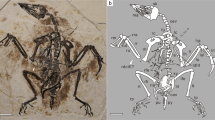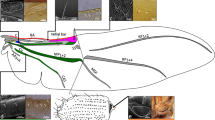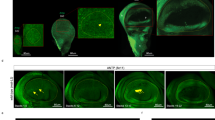Abstract
WITHIN the New Zealand species of the families Corixidae and Notonectidae (Hemiptera-Heteroptera), two distinct forms, depending on the development of the wings and the wing-musculature, have been recognized. In these species a proportion of the population is composed of flightless animals in which, apart from Diaprepocoris zealandiae, the indirect flight-musculature is reduced even though the two sets of wings are not significantly altered from the normal condition. In D. zealandiae the meta-wings are greatly reduced and the meso-wings differ in having a reduced membranous portion.
This is a preview of subscription content, access via your institution
Access options
Similar content being viewed by others
References
Brooks, G. T., Kansas Sci. Bull., 34, 309 (1951).
Hungerford, H. B., Kansas Sci. Bull., 32, 1 (1948).
Poisson, R., in “Faune de France”, 61, 28 (1957).
Brown, E. S., Proc. Zool. Soc. Lond., 121, 544 (1951).
Author information
Authors and Affiliations
Rights and permissions
About this article
Cite this article
YOUNG, E. Degeneration of Flight-musculature in the Corixidae and Notonectidae. Nature 189, 328–329 (1961). https://doi.org/10.1038/189328c0
Issue Date:
DOI: https://doi.org/10.1038/189328c0
This article is cited by
-
The ultrastructure of the flight muscle polymorphism in Cenocorixa bifida (Hung.) (Heteroptera, Corixidae)
Zeitschrift f�r Morphologie der Tiere (1969)
Comments
By submitting a comment you agree to abide by our Terms and Community Guidelines. If you find something abusive or that does not comply with our terms or guidelines please flag it as inappropriate.



